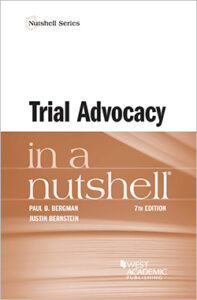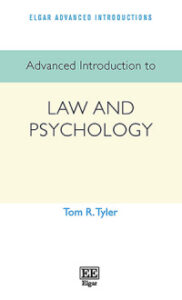TWO NUTSHELLS, TWO GEMS
In a nutshell – using as few words as possible[1]
Nutshell – something of small size, amount, or scope[2]
I don’t know about you, but as a law school student decades ago the “NUTSHELL” books provided concise, user-friendly guides to the law. And unlike case books, they have a shelf life beyond law school. I write here of two “nutshells,” one – on trial advocacy – in the formal NUTSHELL series from West Publishing and the second a lawyer’s guide to psychology that is a succinct and useful summary with that same long shelf life. Each is a guide well worth purchasing.


Trial Advocacy in a Nutshell – 7th Edition (West). Paul Bergman’s longstanding advocacy nutshell got an extensive and invaluable update in this latest edition, one where he has added co-author Justin Bernstein of UCLA, a member of the national trial advocacy community. I knew the book was special (and felt Justin’s touch) when the book makes clear that its focus is on “argument centered narratives” and begins its exposition of inferential reasoning with two phrases – especially when and except when. Those two phrases are anchors – the conduct you urge the jury to accept is more believable in the especially when condition and the conduct that is normative will not occur in the except when condition, the latter a useful tool to get jurors ‘thinking slow.’
This Nutshell defies the dictionary definitions at the top of this article – it is not small, running nearly 600 pages, and its scope is grand, encompassing “evidence rules and procedures” as much as the staples of courtroom advocacy. Particularly useful portions include:
- The simple steps on how to find a “theme.”
- The call to civility in the courtroom.
- The possible technique of the ‘tell your story’ cross-examination.
- The useful advice on how to increase the credibility of an expert who only relied on secondary sources.
- How to undermine the expert’s apparent qualifications, a 5 bullet-point exposition that can be adapted in most case.
- A really important exposition on how to undermine a “silent” attack, e., an opponent’s implicit argument that your witness is not credible because of their social class, ethnicity or other trait.
- How to effectively review trial evidence in a closing.
Along the way there is impressive use of Hollywood ‘trials,’ extended script excerpts that either demonstrate the point or are used as a path to what should have been done. This adds to the readability, along with the occasional dry humor aside:
This favorite objection [badgering the witness]…arises when your adversary poses questions at a rapid pace that won’t allow you time to object (if appropriate) or your witness to think. Just as hearing Flight of the Bumblebee may cause a diner to become flustered and eat too fast, so may rapid-fire questions cause witnesses to make mistakes. This tactic is not what the Constitution means by a “speedy trial.”
Are there points to quibble with? Certainly – how could there not be in a book this comprehensive? I am not at all convinced, and know of no data confirming, that “a judge will generally allow you to refer to your personal opinion [in a closing argument], so long as it is clear that your opinion pertains to evidence in the record rather than extraneous factors.” And if an attorney did feel the need to preface a closing argument with an introductory remark, I would not endorse the option of the ‘what I say is not evidence’ line unless your real point is that ‘and what the other side said sure as heck isn’t evidence…’
But those are minor (and I wonder if they are relics of an earlier edition). This NUTSHELL is a gift to law students and practitioners, especially when they plan on going or do go the court and need something they can turn to for a guide or refresher.
Advanced Introduction to Law and Psychology (Elgar). When a book about psychology’s impact on and interplay with the legal system gets accolades including the assertion that “[author] Tom Tyler – the leading psychologist of law in the world- has written a magisterial appraisal of his field[,]” it is worth taking note.
Tyler is a Professor of both Law and Psychology at Yale and “Affiliated Research Professor” at the American Bar Foundation. His survey of the two fields and their connections is concise and comprehensive, addressing topics as diverse as “scientific evidence and experts,” “credibility assessment,” “prejudice, bias and discrimination,” and “legal decision-makers: judges and juries.” Each section includes both explanations and confirmatory research.
The value of this book is inestimable – each section explains, in a page or two, the principles and their application that lawyers need to know. Consider this example, in the “Civil Justice” chapter. Tyler discusses the theory of “naming, blaming, claiming,” the process where it is believed that those who suffer an actual or perceived harm ‘name’ the injury, ‘blame’ the person or entity believed to be responsible, and then initiates a ‘claim’ for compensation. What Tyler highlights is that, while these are steps, the ‘claim’ stage is often less about money than acknowledgment. Tyler confirms that acknowledgement and apology are strong motivating factors apart from the financial one and that when apologies are presented the injured party often settles for a lower amount. From the Evidence Professor’s vantage point, an apology creates proof – the admission of a party opponent; but from a real world litigation perspective the apology may be key to a fair, more prompt and less costly resolution.
Similar significant insights are in the chapter on eyewitness evidence. Discussing video proof of an event, Tyler debunks the notion that videos generate objective assessment of an event. Even there, prejudices impact what the observer believes the video shows. But Tyler makes an important qualifier – when shown to a jury, there are multiple perceptions that can be discussed and “cancel out the influences of prejudice on the group consensus about what the video depicts.”
Lawyers need solid science. This ‘nutshell’ has it and deserves a place on the bookshelf of those who go to court and those who teach how to litigate.
[1] https://dictionary.cambridge.org/dictionary/english/nutshell
